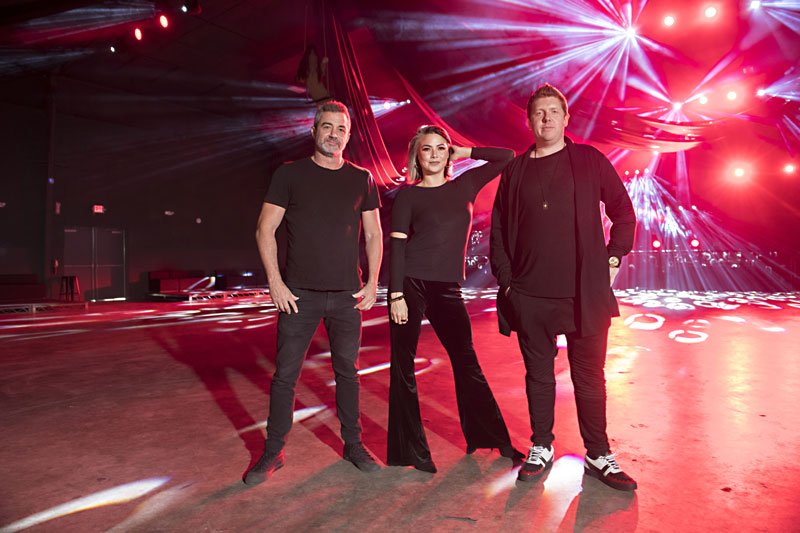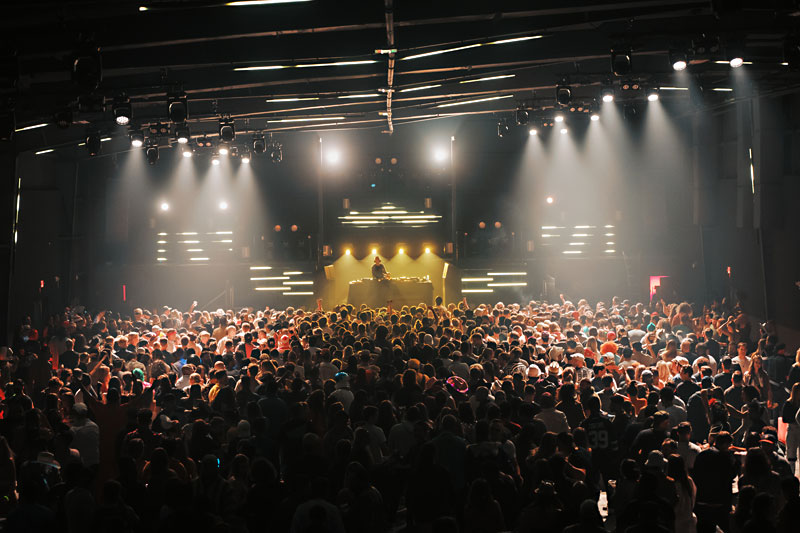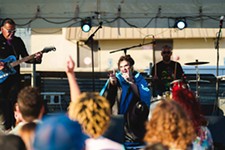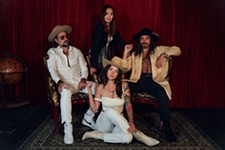The Concourse Project Brings the Raver Spirit Back to Austin
High-capacity event space looks to diversify their sound
By Christina Garcia, Fri., Nov. 5, 2021

Handed the limp remains of a party mecca, Kelly Gray and Andrew Parsons handed back a 2,000-capacity* venue that club kids are already flocking to.
The Concourse Project stands as another example of the duo building their empire separately and together: Gray's GoGo Gadgette dance squad and her clothing designs that retail at the RealFashion store. Parson's work as a DJ and booker, their Seismic Dance Event festival, and – most notably – their production company: RealMusic Events.
Just give them the Raver Power Couple of the Year award already.
Changing the Landscape
The newly opened venue in the city's Southeastern stretch, with a powerful sound system and resplendent lighting, immediately ranks amongst Austin's largest music rooms, but please don't call it a nightclub.
"I think that the word 'nightclub' has a stigma to it," says Concourse's third partner, David Brinkley.
Concourse's calendar speaks for itself. Already, trance-bringer Tiësto, house and techno titan Carl Cox, and Hacienda veterans Sasha and John Digweed have played. Could it be a raver resurgence?
At the very least, it's a significant space for electronic music in a city that identifies as anything but an electronic music hotbed. When Austin was, in fact, that – grownup candy kids fondly remember (illegal) raves and (legal) massives from the turn of the century in Austin, including Electric Daisy Carnival and Airport that brought crowds of 20,000 – local law enforcement happily used the Ecstasy Prevention Act of 2001 and existent "crack house" statutes to restrict rave culture by prohibiting popular festivals and threatening venues that hosted electronic music with one-year shutdowns (see "The Agony of the Ecstasy," which ran in this paper 20 years ago).
Festival phat pants caked with mud were retired, never to flare again, and Austin's electronic events became comparatively tiny with fewer dedicated venues than the genre's popularity would have dictated.
"We've always flown under the radar," Gray says of the dearth of respect original dance music has received locally thereafter. "Often, there are horse blinders on, even though electronic music is a huge industry and leads in other countries – and is huge here! Other folks don't pay attention to it."
A Destination Venue
The road less traveled, aka Burleson Road, leads to the Concourse Project. Past the Goodwill "bins," probation office, and Central Texas Food Bank, a patch of light shines upon your destination, sharing a slab with Latin club Mala Santa.
When I'm on-site, lines at the doors move fast – the queue staffed with longtime RealMusic associates. A go-go dancer-turned-door attendant might scan your QR tickets or strap wristbands at the will-call booth. Soundproofed and sans frills, the promotion company's new industrial digs look like a shipping container's big sister, but sound like an overhead thunderstorm of booming bass. Brinkley characterizes the sound system as "very over-spec'd" and acoustically treated for the space. Production manager Allen Tagle explains how this allows for a richer, more robust control.
Gray reveals they're set to add a soundproofed, second-floor listening room where touring artists can practice new tracks in a studio environment. Also in the works: pixel lighting strips à la Time Warp festival, projection mapping, and holographics.
Already, though, Concourse is outfitted to accommodate wide-ranging events. Trolleys, wheels, and levers transform the room from a max capacity of over 2,000 to an intimate gathering – like a cozy 250. Tuning presets shift the audio accordingly.
Outside, a second DJ plays in a smaller space under the open sky. Live painting brightens the yard and a small market offers black hats embroidered with the word "techno" and other EDM-centric apparel, plus wire wrap jewelry and other hippie-inflected treasure. Meanwhile, Gray's GoGo Gadgette dancers stomp and body-roll in plastic neon bikinis.
Where RealMusic may have before seemed insular in local DJ programming – using their own promoters as opening DJs – they're embracing other house and techno crews now. Vibe Vessel and ubiyu have already played the patio, uniting the disparate party groups.
"Having other spaces, you can give other people opportunities in a way we weren't empowered to do previously," Gray says.
The DJ and the Dancer
As you might expect, opening a music venue from scratch while the concert industry rebounds from a pandemic eats up a lot of your bandwidth.
"I'm trying to get through this and then I can get back into listening [to music] more, and that feeds into the bookings and she can focus on designing outfits and dancing," Parsons says of the more curatorial roles he and his wife would prefer to focus on.
Gray and Parsons started RealMusic as a passion project over a decade ago, but they work mostly in service to the business today.
Mostly.
On a hot July night I'm at Mala Santa to hear Justin Martin, a San Francisco DJ known for his work with the Dirtybird label. Kelly Gray's in the bathroom working on her makeup. She's got eyelashes to glue, hair to spray, and pounds of eyeshadow and gloss spread all around herself and one of her fellow go-go dancers. She'll be onstage soon in glittering black thigh-high sneakers, a 3-foot-long pink braid, and gloves up to her armpits. Tonight, the co-owner of RealMusic is also a go-go dancer. The San Antonio native honed this craft over a decade, even dancing at Korea's iteration of Ultra Music Festival.
As a freshman at UT, Gray found a home in Austin's dance music culture. She attended a 2005 Halloween event at the Electric Forest – a 3.5-acre patch of now-developed woodland near South Lamar and Oltorf that acted as a renegade art and events compound in the Aughts – and became inspired. Three years later, she founded the GoGo Gadgettes dancer crew, one of many local dancer crews who, on any given weekend, strutted around parties in furry boot covers and hand-stitched, torn, and shredded outfits. A self-taught designer, Gray now operates East Sixth Street boutique RealFashion, where her own accessories and dance gear retail alongside indie brands and wares from friends.
Recently, Gray is less often seen go-go'ing at shows and more often spotted with a walkie-talkie on her hip and a headset around her neck. As any good host knows, sometimes you get too busy to enjoy your own party – though Gray has other reasons for dialing back dancing duties.
"It's not so much because of needing to focus on one project or the other. It's because of losing credibility. Dancing has a stigma or people think pretty little girls put on makeup and dance around," says Gray. "But we're actually performers who do really cool, amazing things and it shouldn't be lesser than other artistic outlets."
Dancers and their creative costumes have always been central to the universe Gray's built with RealMusic, but she laments that some in the live event industry overlook her bona fide business acumen because of her go-go work.
"You get branded as a dancer and it overshadows my contribution to the business as a whole," she says. "I'm the executive producer of the Seismic brand and fulfill the vision and logistics of the festival ... but outside people don't see it properly. I've been introduced as, 'This is Kelly, she manages the dancers.' And I'm like, 'Excuse me, I'm a partner in this company.'"

Kelly finds that prejudice toward dance artists both infuriating and motivating.
"I want to get back to being able to divide my attention the way that I want to," she says. "But that is something I have felt over the years that has been kind of disappointing. If I go back to [dancing and design], am I gonna get this feeling again? There's a stigma."
On that night in July, Gray's opera-length gloves won't stay in place. They slip down repeatedly onstage and she keeps hiking them up, adjusting mid-performance. It's an act emblematic of the steadfast, work-through-any-issue nature needed to succeed on either side of the stage lights for 12 years.
"We are where we are because of Kelly," says Parsons. "Most women do a better job managing events."
Parsons caught the raver bug even earlier. He was attending raves by the time he was 13 and remembers the Scooby Doo Crew throwing huge parties in Houston. By the age of 15, Parsons was DJ'ing and being booked to play clubs he wasn't old enough to get into.
"We're artists first – I love DJ'ing," he allows. "It's my No. 1 reason why I started."
While in high school, Parsons founded his own record label called RealMusic – the original minting of that brand name – and began producing music shortly afterward. He recounts being one of the earliest labels to distribute on Beatport, a digital music hub for electronic dance music, but attention to the concert promotions business left him with little time to curate a label.
"I listen to a lot of music. The stuff we book are things I like," said Parsons. "When I don't have time to listen to music I feel like I'm not doing my job as well because I base my bookings on that. I'm good at seeing what's hot next."
Gray's Bitchin Birthday Bash in 2008 at Burleson Warehouse brought the respective dancer and DJ together as promoters for the first time. A dozen years later – during which they married, started a festival, and became Austin's premier dance event enterprise – the Concourse Project represents Gray and Parson's most momentous endeavor.
"We're not building this just for ourselves. It's bigger than us," Parsons states. "It's something Austin, as a whole, needs. We want as many people involved and to feel good about this as we do."
Brighter Nights
Before RealMusic Events emerged, Austin's heyday as a major electronica city in Texas had already come and gone. In 2001, public access television aired the city's permit denial to massive event promoter Noah Ark – who staged Airport and Electric Daisy Carnival – and the scene wilted. Noah himself eventually became an entertainment lawyer in California and electronic music retreated to necessarily smaller clubs. Where Noah's events brought in some 20,000 attendees, specifically EDM clubs like Plush, Kingdom, Barcelona, Ethics (formerly Lanai), Republic Live, and Karma were small- to lower-midsized rooms. All the aforementioned venues had shuttered by 2020.
In the Aughts and early 2010s, big-draw acts like Skrillex toured through the Austin Music Hall, and era staples like Benny Benassi, DJ Keoki, and Deep Dish's Sharam made frequent appearances at local clubs. RealMusic, however, brought in new talent, leaning into a progressive sound exemplified by labels like Anjunadeep, while steadily adding a more diverse palette from across the electronic music spectrum.
"We both really like melodic techno, deep house, progressive stuff, tech house, and normal techno," Gray says of the company's preferred genres. "Drum 'n' bass too. We can appreciate a good bass show. We'll actually do more of those at Concourse and just have more variety."
The Concourse represents the end of a long nomadic road for RealMusic. After years of schlepping sound and lighting to various venues, RealMusic first found a home when they landed a three-year partnership with Kingdom Nightclub, a venue with an already stellar reputation for hi-fi production. The club opened in 2011 and, by 2012, RealMusic was a mainstay. Notorious real estate investor Nate Paul swooped in like a deus ex machina in 2018, ending the Kingdom-RealMusic relationship when he locked the tenants out. Attempts at legal negotiations failed to save the venue, sending Gray and Parsons back to different clubs around town. Shortly after, the pandemic would hit, affording the couple a surprisingly welcome break, downshifting from over 100 annual shows to less than 10.
"I was extremely burnt out," admits Parsons. "COVID helped."
While making masks for income, the couple searched for a new venue. Meanwhile, their RealMusic Events and Seismic festival received federal pandemic relief funding to the tune of $675,513 via Shuttered Venue Operator Grants.
Enter the third partner at the Concourse Project, London-to-California-to-Texas entrepreneur David Brinkley.
"I grew up in England in the late Eighties when house music exploded, so it's been part of my culture," he says.
Brinkley owns San Francisco nightclubs Love+Propaganda (formerly Vessel) and Audio, which Gray considered a sister nightclub to Kingdom in sound and concept, but, upon feeling a market squeeze in the Golden State, turned his attention to Austin.
"At a certain point you compete with yourself and I needed to get out of that market," says Brinkley. "I also wanted to get out of California because it's not the best place to do business."
Brinkley sees opportunity in the versatility of Concourse.
"A nightclub model is a relic of the past, in a way, and really limits you," he explains on an early September video call. "We agreed to make it more of an event space where we can still do the things that we like, but also open it up to a much wider audience: fashion shows, dog shows, wine tastings, and more corporate-type events. It's a blank canvas rather than a nightclub with a very specific design aesthetic that [won't] age well. Any nightclub, after five years you want to change. Something that's more of an event space is more timeless."
Accordingly, Parsons reveals that Concourse is in discussions with Resound, the prominent Austin booking company that rose from the ashes of Margin Walker and is known for a clued-in curation of indie, punk, hip-hop, metal, and pop.
"Right now, the calendar is full, but starting in 2022 we want to diversify the sound," notes Parsons. "We want the place to be a mecca for a lot of stuff – an adult playground. Come get some food and check out some art and see a band or DJ."
Interestingly, Gray and Parsons also both mentioned dog shows in separate interviews. May the best pooch win.
Seismic Levels
Next weekend should bring the biggest Concourse crowds since the debut of the indoor space in September. Seismic Dance Event is a smorgasbord of electronic talent, drawing nearly 5,000 attendees in a nonpandemic year. The festival, running Nov. 12-15, counts performances from over 50 marquee DJs including South African house producer Black Coffee, downtempo maestro Bonobo, Russian dentist-turned-producer Nina Kraviz, and Crosstown Rebels house shaman Damian Lazarus. A stage of local DJs usually complements two other headlining stages, and RealMusic is set on distinguishing sounds at each stage soon: Think tech house here, deep house there.
The inaugural Seismic in 2018 took place at the Travis County Expo Center and earned a spot on the nominees list for DJ Mag's Best Boutique Festival award with headliners like the glitter-drenched Desert Hearts crew. Next weekend's run transpires as the second Seismic of 2021, the first having been a partially outdoor event in May that was impacted by rain. Gray and Parsons say they agreed before the pandemic to try two festivals in one year, but they'll revert to one per year going forward.
As for future plans, the pair says they'd like to pull back and focus on creating other festival brands.
"We've got this disease where we see situations ripe for a good party or event and want to make it happen," says Gray, making 12 years of event creation sound like just the beginning.
Correction: [Nov. 5, 10:45am] the original version of this story stated the capacity of the Concourse Project as 3,000. The indoor capacity of the venue is 2,000. The tense of a verb has also been changed to reflect that David Brinkley still currently owns San Francisco nightclubs Love+Propaganda and Audio







